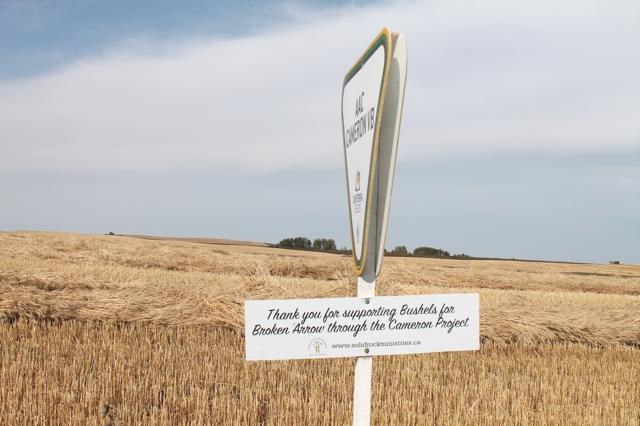The Broken Arrow Youth Ranch has been feeling an extra portion of gratitude during this Thanksgiving holiday season thanks to local businesses and producers coming together. When organizing fundraising plans earlier this year, ranch CEO Rick Hawreschuk noted that churches everywhere were feeling exhausted with the many projects to support. Broken Arrow decided to branch out into a diverse form of fundraising that tapped into its own ranching and farming roots. Wheat crops were planted and sold this year as a fundraiser for the ranch.
The Broken Arrow Youth Ranch aims to help struggling families by offering their children an opportunity to live on a working ranch for an extended period of time. The staff minister to the entire family and connect them to resources to help them grow towards healthy reunification with their children. The ranch depends on fundraising and donations from churches, businesses and individuals to operate.
The idea was born when Todd and Lara Moroz, who work at Broken Arrow and are long-time supporters, were sharing the story of the ranch with family members Jennifer and Tom Fetch, who are both crop scientists with Agriculture Canada. The two researchers canvassed their connections within the agriculture community and Canterra Seeds. Through the Fetchs, a partnership between Canterra Seeds and the Broken Arrow Youth Ranch was formed. “Lauren Wensley, a representative from Canterra, has gone above and beyond to make this a win-win-win project for all involved,” said Hawreschuk. Canterra was able to test a new crop variety in the field with producers, while giving the ranch an opportunity to benefit from the yield’s profits.
Canterra supplied AAC Cameron VB seed, a new variety of Red Spring Wheat that was high yielding, midge tolerant and fusarium resistant. The project was called the “Cameron Project”, derived from the name of the seed used as well as in honour of Todd and Lara Moroz’s son, who they lost some years ago during open heart surgery to repair a congenital heart defect.
Seven producers took part in the project including the Mackenzie Farm in North Portal, the Hergott Farm in Bruno, the Severson Farm in Norquay as well as other families at Coronach, Wilkie, Strasbourg and Limerick. Canterra supplied each farm the seed to plant 40 acres. The producers donated the use of their land as well as time, labour and equipment.
Hawreschuk noted that, right from the start, a lot of people and organizations came together to make the project possible. The seeds were grown by Avondale Seeds in Reston, Manitoba, and Greenleaf Seeds in Tisdale. Dupont Chemical donated enough Express herbicide for each farm, while other corporate donors chipped in with various input costs like Southland Coop in Assiniboia and Coronach, Cargill in Congress, CPS in Torquay and Pelly, Limerick Coop, Arysta Life Science, Bulyea Coop and Bayer Crop Science. Others like Peter Seed Farm in Congress, Riesner Seeds in Limerick, Double Diamond Farm Supply in Alameda, Nelson Farm in Glentworth and Remche Farm near Lafleche assisted with seed storage, delivery and even distribution, added Hawreschuk.
“We also had a number of personal donations towards the project which allowed us to offset a few other small costs for the producers,” says Hawreschuk. “We are thrilled with the help that we received from supporters. It’s a win-win situation,” Todd Moroz added.
The Cameron Project yielded between 26-70 bushels per acre on average. “It was amazing how dry it was here in the south and how well the crop did,” Moroz said. Canterra asked the producers to market the crop as they would normally. The funds from the wheat sales will go to the youth ranch for the operational costs of the ministry and ranch.
Following the lead of the Cameron Project, others came forward to support Broken Arrow through farming donation. Corn was grown to help supplement the ranch’s cattle this winter after a dry and difficult summer. Corn seed was donated from a Winnipeg family. Another family in Coronach planted and donated labour and time, while inputs came from Peak Dot Ranch, Limerick Coop and Monsanto.
“For all those who have partnered with us in helping families heal and grow, we say sincerely thank you,” says Hawreschuk.
Broken Arrow plans to grow crops as a fundraiser next year. Canterra is interested in testing another new seed variety of durum called “Congress” next year.




